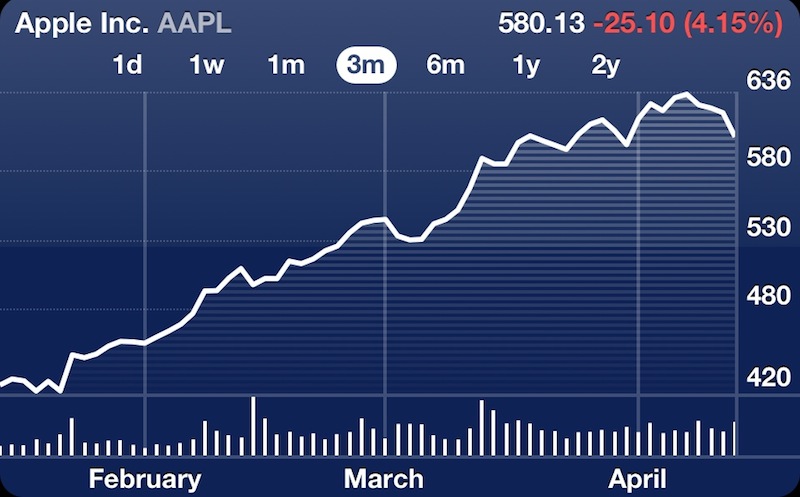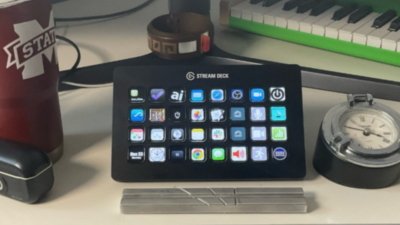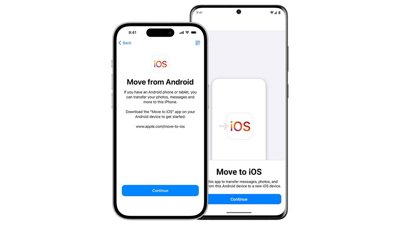Apple's share price is still high for the year, having fallen only back down to prices last seen in the middle of March. The company's stock rapidly and steadily appreciated from $411 at the beginning of January, surging on the news of the company's spectacular winter quarter sales.
Some reports attributed the drop to rumors initiated by BITG Research analyst Walter Piecyk, who went against the grain last week in issuing a downgrade on the company based on fears that mobile carriers would begin refusing to pay top subsidies to carry the iPhone.
Piecyk wrote that mobile carriers have "offered generous upgrade policies including some that enabled a fully subsidized phone upgrade only one year in to a two year contract," but warned, "We expect those policies to change as the faster upgrade rate of smartphones compared to legacy feature phones has been a costly surprise to post-paid and pre-paid operators, alike."
As a result, Piecyk predicted a worldwide drop in Apple's iPhone sales of 27.5 million units in the company's fiscal quarter third quarter, "resulting in a revenue estimate that is $1 billion below consensus.â€
"Of course, our thesis will not be supported in the current quarter as the pent up demand in China and the launch of the iPhone in 30 additional markets is likely to drive strong sales that will offset the sequential declines in other markets," the analyst wrote.
Carriers have made changes to their boost short term profits after paying Apple industry leading upfront subsidies and guaranteeing minimum iPhone sales with prepaid blocks of orders. Verizon Wireless, for example, has instituted a new $30 fee for upgrading, a move that appears intended to recapture profits from its existing Android users who want to upgrade to an iPhone.
However, a sales collapse due to new carrier fees has not occured in the face of previous efforts by carriers to protect their bottom line with even more expensive early termination fees and other charges targeted at iPhone buyers.
Additionally, there's nothing new about predicting that Apple might lose ground with lower carrier subsidies. Last year, James Ratcliffe, an analyst at Barclays, warned of virtually the same thing, predicting that Verizon would only sell 9 million iPhones in 2011 and AT&T would only sell 6 million, due in part to cuts in carrier subsidies that would make iPhones appear to be more expensive.
In reality, AT&T sold 9.4 million iPhones just in the fourth calendar quarter of 2011, and Verizon sold 4.3 million in the same quarter. Neither carrier has cut its iPhone subsidies, even as Sprint and a variety of new carriers have joined Apple in selling iPhones in the US.
Additionally, Apple is widely expected by analysts to sell 30-37 million iPhones in the current quarter, nearly as many as it did in its blockbuster winter quarter. American carriers have not signaled any intention of cutting their iPhone subsidies, and internationally many carriers sell iPhones at full price. Apple also sells iPad, iPod and Mac products that aren't affected by carrier subsidies and make up roughly half of its business.
 Daniel Eran Dilger
Daniel Eran Dilger







-m.jpg)






 William Gallagher
William Gallagher
 Amber Neely
Amber Neely
 Christine McKee
Christine McKee
 Andrew O'Hara
Andrew O'Hara

 Sponsored Content
Sponsored Content
 Charles Martin
Charles Martin










78 Comments
Just to remind the clown who doubted what I was saying...
http://forums.appleinsider.com/showp...8&postcount=31
Buying opportunity!
Just to remind the clown who doubted what I was saying...
http://forums.appleinsider.com/showp...8&postcount=31
Just to remind the clown who doubted what I was saying...
http://forums.appleinsider.com/showp...8&postcount=31
Nice!
Profit taking before earnings release. Nothing to see here, move on.